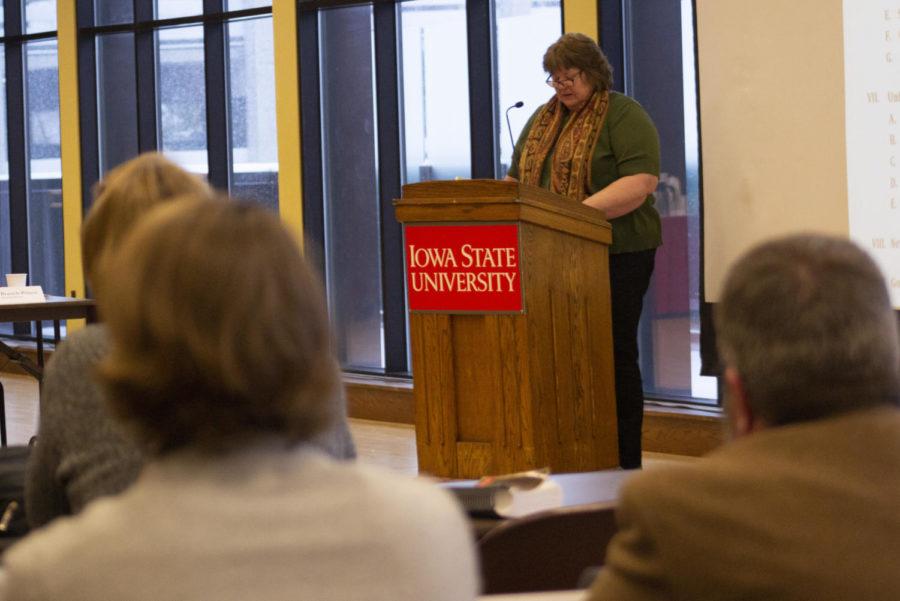- App Content
- App Content / News
- News
- News / Politics And Administration
- News / Politics And Administration / Campus
Faculty Senate introduces Carol Faber as president-elect
Kennedy DeRaedt/Iowa State Daily
Carol Faber, Associate Professor of graphic design, gives a speech on why she should be Faculty Senate President-Elect. Faber said, “Leadership takes listening, good communication, open-mindedness and a willingness to do the hard work, while working with others.” During the Faculty Senate meeting the members cast their votes and Faber won against Andrea Wheeler, Assistant Professor of architecture. Electing a new President-Elect was on the agenda for the Faculty Senate meeting on Jan. 22 in the Sun Room of the Memorial Union.
January 22, 2019
Carol Faber was announced as the president-elect of Faculty Senate Tuesday.
Faber, an associate professor of graphic design, will take her place as president-elect of the Faculty Senate during the fall 2019 and spring 2020 term. Faber has been on the Faculty Senate for six years.
Previously, Faber has served on the Governance Council where she facilitated changes in the handbook for four years. She has also been the chair of the Judiciary and Appeals Council for the past two years. As chair of the Judiciary and Appeals Council, Faber facilitated Chapter IX grievances and appeals.
“The reason I am running for president-elect is the same reason why I took on the role of [Judiciary and Appeals] chair: To help be part of the solution; to learn how policies and procedures in the Faculty Handbook work in practice and to look for ways to make our shared governance effective,” Faber said. “Leadership takes listening, good communication, open-mindedness and the willingness to do the hard work while working with others; and I have these skills.”
Other items discussed at the Faculty Senate meeting included updates on the Margaret Sloss Center for Women and Gender Equity, Facilities Planning and Management, a new master’s program, amendments to the Faculty Handbook and a resolution against bullying and intimidation on campus.
Ruxandra Looft, the new director of the Margaret Sloss Center for Women and Gender Equity, made her first appearance at the Faculty Senate to introduce herself. She also explained the importance of the new name of the Margaret Sloss Center and including gender-neutral individuals in its services.
“What we know as researchers is that there have always been individuals who don’t firmly identify as male or female … they are individuals who feel that they identify on a spectrum where they aren’t on one end of the spectrum or the other,” Looft said.
Looft also said the best way to know how to properly address a gender-neutral individual is to ask them what their pronouns are. Looft said doing that makes many feel more comfortable talking with someone.
Associate vice president for Facilities Planning and Management Paul Fuligni also addressed concerns of the sustainment of buildings on campus.
Fuligni said the backlog of deferred maintenance has become so large that all necessary renovations and repairs cannot be completed on time, but Iowa State is “really not worse off than any other Regent university.”
Current president of the Faculty Senate Peter Martin also gave his president’s report at the meeting. Martin touched on the faculty transition to WorkCyte that will begin on July 1, 2019.
Martin said WorkCyte will simplify access to Iowa State technology for faculty. Another way this will happen is through the Okta multi-factor authentication, which will happen on March 1, 2019. There will be WorkCyte workshops available to all faculty members within the near future.
Martin also touched on the Action Items to Enhance Campus Climate Faculty Experience Workgroup Final Report. The final report included five initiatives concerning faculty: Creating and promoting the Cy for civility culture shaping campaign; developing campus-wide policies, guidelines and practices against bullying; increasing access to high-quality child care; enhancing departmental interactions among colleagues; and becoming more inclusive through the equity, diversity, and inclusion initiative.
“There is a common theme that pervades all these five initiatives,” Martin said. “The theme asks the question, how we interact which each other as faculty and more broadly as colleagues across campus. The general theme suggests that we need to continuously work to be the best academic community we can be.”
The final items were finishing business from the December meeting. The proposed master’s of science in event management was approved by the Senate. This proposed online course is one of only a handful in the world and one of the first in the U.S.
The Action Plan Mediation policy and Resolution against Bullying and Intimidation on Campus Resolution were also approved at the meeting.
















